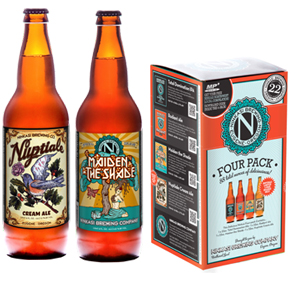
The multi-structure expansion plan includes a 7,800 square foot warehouse to be used for cold storage and local distribution. Also in the plans are 28,000 square feet of office space that will include a pilot brewing system for education and experimentation. Both of those facilities – and an expanded 26,000 square foot brewing facility – will compliment the company’s existing space which is located right next door. When the project is complete in late 2014, the brewery will be capable of churning out 295,000 of beer.
Fueling the “Ninkasi campus” expansion is pent up demand for one of the country’s hottest craft brands. On recent trips to the Great American Beer Festival and the National Beer Wholesalers Conference, Brewbound polled a number of distributors, asking them which brands they most wanted to add to their growing craft portfolios. Ninkasi was almost always listed in the top three.
So why do so many wholesalers want to sell Ninkasi beer? It could have something to do with the company’s tremendous growth over the past two years – the company is projecting 95,000 barrels of beer for 2012 and that’s up from just 33,000 in 2010.
And helping to drive that rapid growth are strong distribution partnerships and a strategic selection process when interviewing potential wholesalers. Marty Ochs, Ninkasi’s national sales director explained.
“The two things almost every craft brewer does is look at the qualitative side of a distributors work,” he said. “What is their craft knowledge and their craft account knowledge?”
But beyond that, Ochs said he has a detailed, 30-page ‘launch book,’ which includes information about the Ninkasi brand like product pricing and Symphony IRI data.
“The biggest aspects I look at are quantitative,” he said. “I want to know how they execute the most simple thing they do — deliver beer. I want to see how many sales reps they employ per account and how they pay those sales reps. I want to know how many delivery drivers and merchandisers they have. Basically, I need to know from day one how their culture works because if a partnership is going to work, we have to be speaking the same language.”

“With so many craft brands in their book,” he said. “How do they take one craft brand out to their retail partners and grow it? I honestly believe that only a distributor can grow a brand and I want to know how they are going to do it. “
The strategy could be paying off. Ochs said the brand is not only seeing “tremendous growth” at various convenience, grocery and chain retailers but also at the on-premise level. He said the company has grown its draught business over 25-percent year to date and seeing better-than-expected results in recently added markets like Montana.
Behind the growth are key retail opportunities with chain accounts like BevMo!, Wal-Mart and Total Wine & More, which Ochs said make up a large chunk of Ninkasi’s off-premise business.
That business will soon be growing even more, as the company plans to expand across most of California. The brand is currently only available in three Bay Area counties — San Mateo, San Francisco and Santa Clara — but Ochs said that is about to change. Ninkasi will roll out with at least seven new distribution partners before the end of 2012, though formal contracts have yet to be signed. The company hopes to complete a statewide roll out in 2013.
But distributors hoping to get their hands on the coveted Ninkasi elixir might have to wait a while. Ochs said the company isn’t planning to open distribution in any new states next year.
“We are trying to create a plan for long term success,” he said.
And for Ninkasi that means planned and managed growth.